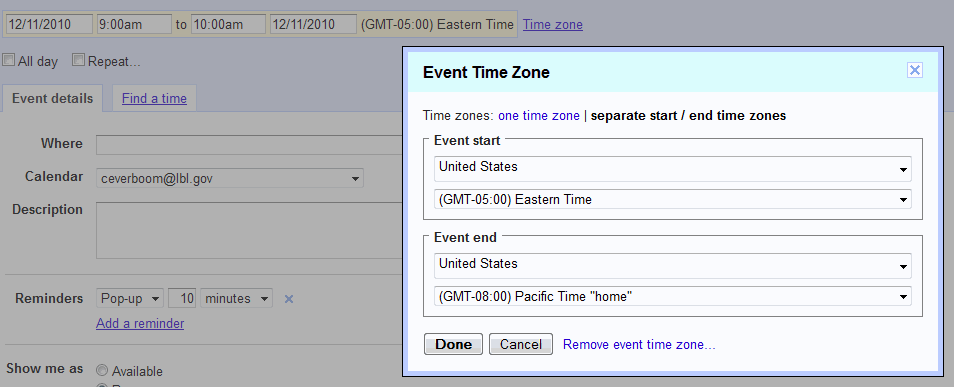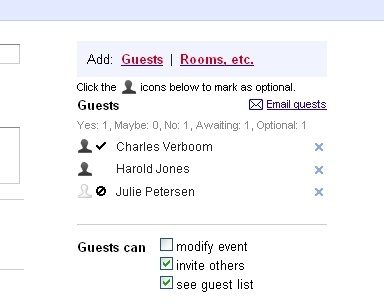It's been over three years since IT began a program to aggressively evaluate cloud services and ensure that every new service we consider includes an evaluation of available cloud offerings. We believe that cloud services have the potential to offer better, more frequently updated features and additional security while potentially reducing our overall costs and environmental footprint. That doesn't mean that every service is best delivered from the cloud, but we want to make sure we're evaluating these services appropriately and making them part of our service mix where they fit in best.
Our largest cloud service rollout to date has been Google Apps. Google Docs and Sites was rolled out over 18 months ago, Calendar migration was completed in the fall and, as of November, the migration of mail from our IMAP system is essentially complete. We're looking forward to additional Google Apps core services development in the coming year, including the transition to GA+ which will provide Berkeley Lab users with the ability to use their LBL credentials across a range of work-related Google Apps including Google Code, Reader, and Picassa.
One cool feature of Google Apps is the Marketplace, which allows IT to add additional capabilities to the Google Apps Suite through third party providers in just a few clicks. Smartsheet and Manymoon, two great applications with different takes on project management in the cloud, have been great additions to our collaborative services suite that offer point solutions to particular collaboration problems.
On the business systems side, we've completed the rollout of two Software as a Servie Applications (SaaS), Point and Ship (for managing shipping) and Daptiv (for Ops project management). Taleo, a SaaS Talent Management Application, is being deployed now and will be our first major business system in the cloud.
On the evaluation front, we're looking at SaaS applications in the service desk management and HR space as part of larger evaluations of our strategic direction in these areas.
All of these systems do or will leverage IT's Identity Management Infrastructure (SAML/Shib) which allows our users to continue to use one password and one account even in the cloud.
In the new year, we'll also be launching the SaaS service Carbonite for user-managed desktop backups, which will radically reduce the cost of desktop/laptop backups to the Laboratory.
Finally, we continue to work with Amazon's various offerings to make these services available to the Lab Community. Amazon S3 continues to be evaluated for backups of large datasets. Amazon EC2 servers are available to anyone at the Lab, with LBL-specific templates and a VPN connection to LBLnet. After beta testing, we are preparing to test the first scientific application on Amazon HPC instances over the next few weeks. We want to enable the Laboratory community to make easy use of these and other cloud platforms in the future, so we're working to negotiate agreements and put in place systems which allow us to provide "on demand" services to the community without the need to go through complex procurements for each new use of these services.
Our colleagues at NERSC have been testing Amazon's new HPC instances, and we're looking forward to making both regular EC2 and EC2 HPC instances available to the Lab with the expertise to configure and manage them in the coming months.
Overall, we believe our cloud strategy has been working well. We're on a path that will allow more and more of our resources to be devoted to the services that enable the scientific mission of the Laboratory and improve our operational efficiency.
Is your Division or Group making use of cloud services? Tell us about it by sending email to collaborate at lbl.gov.
A much requested feature has been implemented by Google. It is now possible to create an event and select a timezone for the meeting (the start and end times can each specify a different timezone). This is how it looks when you click on the timezone link.
We often think of Cloud Services like Google Apps as keeping the strain off your desktop or laptop, but many of these services actually require quite a bit of horsepower from your browser. Google Chrome was built by Google to have excellent javascript performance which allows Gmail and other Google Apps to run more smoothly. Google Chrome will be considered for inclusion as part of our standard software package for ops desktops and we encourage the Laboratory to try it out to see whether it works well for you. And whatever browser you use, remember that it's more important then ever (for both security and usability) to keep your browser completely up to date.
Why use the Google Chrome Browser ?
These reasons were provided by James Lee of our Google Team:
- A single input field, the "omnibox" (Firefox could do this too, with some configuration changes. It's far simpler than having both an address bar and a search bar)
- Syncing of Bookmarks, Preferences, Extensions, Themes, etc.
- Better insulation from problems; in many cases, only a single tab will crash, vs. the entire browser.
- Better RAM utilization (in my anecdotal, totally non-scientific experience)
- Extensions can be installed without restarting the browser (maybe Firefox can do this too now?)
- PDF viewer & sandbox
- Many nice Google-created extensions, such as
- Send from Gmail, that makes it easy to set Gmail (even lbl.gov Gmail) as the default mailto: handler
- Google Calendar
- Docs & PDF/Powerpoint Viewer
- Web clipboard
- Screen capture (This may replace Skitch for me. It will be especially cool if/when they enable saving to Gdocs)
- There's even an interactive "New to Google Chrome" guide .
We are experience some issues with Google Calendar (starting around 8am this morning, for some users).
you may get a server error message when trying to load calendar. In some cases, you may not be able to add an event or see events a few months out.
Ticket #865764 has been created with Google as a high impact issue.
Posts marked Linked are links to blog posts, websites, and news stories that we think the Berkeley Lab community might find interesting...
How Google Docs won me over - Stephen Shankland
With a single new feature added to its online word processor yesterday, Google has diminished many concerns I had about taking the cloud-computing plunge a few months ago.
Read more: http://news.cnet.com/8301-30685_3-20023084-264.html#ixzz163ubmPVF
Google is rolling out the ability to edit your google docs from your mobile device, including iPad and iPhone. More information>>>
We have received reports that Google Calendar is failing to load for a number of Berkeley Lab Customers. (as of 8AM)
We submitted a ticket with Google and noted that their applications dashboard is now indicating an issue.
http://www.google.com/appsstatus#hl=en
UPDATE: 10:25AM - According to Google, the Calendar problem has been resolved.
Google is gradually rolling out another enhancement to the Calendar Product. The ability to label guests as "optional" when you create a meeting is being deployed. We understand that this will be completed by November 16 for all enterprise customers.
The following screen shot gives you an idea of what the user interface looks like. We think the Smart Rescheduler lab is eventually going to take advantage of this feature when providing suggested times to schedule a meeting.
Over the past four years, Berkeley Lab's IT and EETD Divisions have been working on a number of cooperative projects around greening our data centers. At an event on Tuesday with industry partner synapsense, EETD researchers and IT's data center managers discussed the innovations made possible by realtime monitoring. More information is available in the article below:
DOE lab teams with wireless company to curb data center's power needs (11/10/2010)
BERKELEY, Calif. – The Bay Area's foremost energy research facility has increased its data load capacity by 50 percent over the past three years with virtually no additional investment in cooling infrastructure, according to officials at the Energy Department.
More from Greenwire>>>
A contract with Carbonite was signed last week. Initially, IT staff will be working with current backup service customers using "Connected" for their internet based backup solution and replacing it with Carbonite.
The new service will be significantly cheaper that either Connected or our own in-house Veritas NetBackup solution - both of which are used for laptops and desktops.
Access to the new service will be provide through the Software Download Site and available for general use by the end of the year.
Google continues to bring out new features in Google Docs. For those of you using Gdocs for real time collaborative editing (the same doc at the same time with multiple editors) - improvements in our ability to see what others are updating, the ability to communicate in an ad-hoc Gdoc centric chat session, and improvements to the options for sharing stand out.
The spreadsheet and drawing applications are gaining functionality as well. We often see these incremental improvements when the rest of our customers see them and it is useful to revisit the new features link at the top of the Google document - it may surprise you that so much is being added.
Camtasia relay Version 3 is expected to come out soon. We will upgrade our test environment when it does, and start to recruit volunteers willing to test the software.
go here for details on what version 3 will offer.
The IT Division has over 100 virtual machines running on an enterprise VMware based environment. The Infrastructure Group within the Lab’s IT Division has been deploying virtual machines using VMWare in a pilot mode since January 2007
Three primary reasons why we think this makes sense: Energy Savings, space optimization, and increased efficiencies in deployment of new applications.
- Energy savings accrue due the reduced use of physical servers for testing and development environments, which typically have much lower duty cycles, yet consume a significant amount of energy while powered up.
- Increased Efficiency: much quicker response in setting up test and production environments, ability to have virtual machines for product and service evaluations-to perform ‘what if’ scenarios without buying a physical server. It will also reduce costs in acquisition of underutilized single purpose physical servers.
- Space is a critical resource at the lab. By consolidation of physical machines into institutionally provided computer room space using virtualization technology, office space can be reclaimed to support the significant growth in lab employee count.
We have extended use of the VM environment to experienced system administrators who work in the IT Division on behalf of a customer. Because we can restrict the scope to experienced staff, the costs for providing the service can be reduced.
The Smartsheet road map can be found here. For those of you who would like more granular permission assignment, it looks like some improvements will surface before the end of this calendar year. (the ability to lock down editing of a particular column, for example.
We would like to confirm the scheduling of a production outage for the evening of 11/9 from 6pm - 10pm.

